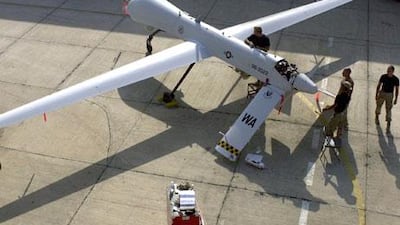WASHINGTON // Plans to base unarmed American surveillance drones in the African nation of Niger highlight the Obama administration's growing concern about extremist influences in the region. They also raise tough questions about how to contain Al Qaeda and other militant groups without committing US ground forces in yet another war.
In the short run, a drone base would enable the US to give France more intelligence on the militants its troops are fighting in Mali. Over time it could extend the reach not only of American intelligence gathering but also US special operations missions to strengthen Niger's own security forces.
The US and Niger in recent days signed a "status of forces agreement" spelling out legal protections and obligations of US forces that might operate in Niger in the future.
The Pentagon spokesman George Little acknowledged the agreement, but declined on Tuesday to discuss US plans for a military presence in Niger.
The US has found some of its efforts to fight extremists hobbled by some African governments, whose own security forces are ill-equipped to launch a US-style hunt for the militants, yet are reluctant to accept US help because of fears the Americans will overstay their welcome and trample their sovereignty.
At France's request, the US has flown 17 air force transport flights to move French troops and their equipment to Mali in recent days, Mr Little said. US aircraft also are conducting aerial refueling French fighter jets based in Mali, he said, and those operations will continue.
Other US officials said the Pentagon is planning a new drone base in north-western Africa - most likely in Niger - but the plans are not yet complete. It would provide more extended US aerial surveillance of militants in the region without risking the loss of air crews. The main US drone base in Africa is in Djibouti.
Niger has accepted the idea of hosting unarmed US drones as well as conventional and special operations troops to advise and assist Niger's military on border security, but it has not endorsed armed US Predator strikes or the launching of US special operations raids from their territory, according to a senior U.S. military official briefed on the matter.
Africa is increasingly a focus of US counterterrorism efforts, even as Al Qaeda remains a threat in Pakistan, Yemen and elsewhere. The recent terrorist attack on a natural gas complex in Algeria, in which at least 37 hostages and 29 militants were killed, illustrated the threat posed by extremists who have asserted power propelled by long-simmering ethnic tensions in Mali and the revolution in Libya.
A number of Al Qaeda-linked groups operate in Mali and elsewhere in the Sahara, including a group known as Al Qaeda in the Islamic Maghreb, or AQIM, which originated in Algeria and is active in northern Mali. This month French forces intervened to stop the extremists' move towards Mali's capital, and Washington has grown more involved by providing a variety of military support to French troops.
At issue for the Obama administration is the degree to which these groups threaten US security interests.
"AQIM poses a threat in the region, and I can't rule out the possibility that AQIM poses a threat to US interests," Mr Little said. "This is a group that has shown its ability to demonstrate brutality and to conduct attacks. And it is very important that we work with our partners in the region and our allies to thwart them."
General Carter Ham, the commander of US Africa Command, said last week that the worry is not just the intentions of AQIM but the ability of like-minded groups to leverage their capabilities by working together.
"We're starting to see the increasing collaboration, sharing of funding, sharing recruiting efforts, sharing of weapons and explosives and certainly a sharing of ideology that is expanding and connecting these various organizations," Ham said at Howard University. "And I think that's what poses at least the greatest immediate threat in the region."
The administration has ruled out sending US ground forces to Mali. Its view is that military involvement, while necessary, is not a solution to the region's problems.
"We have said all along that there has to be more than a purely security solution to the problems in Mali, that the security track and the political track have to go hand-in-hand, that a key component of returning stability to Mali includes new elections and overturning the results of the coup firmly," State Department spokeswoman Victoria Nuland said on Monday. She was referring to the coup last spring that prompted the US to withdraw military trainers and cut off other forms of direct military assistance.

